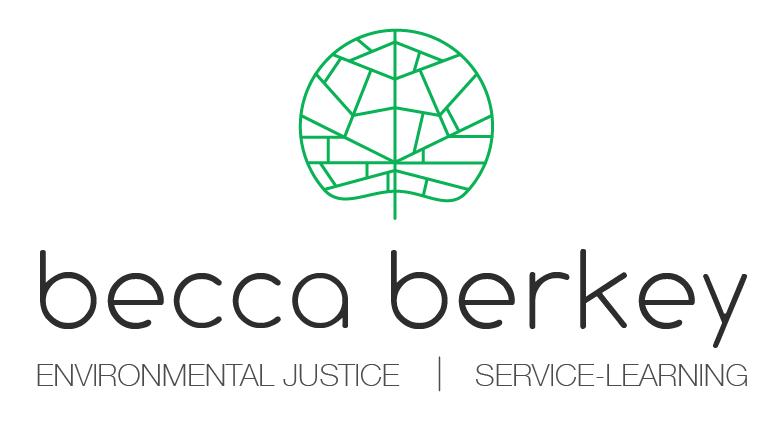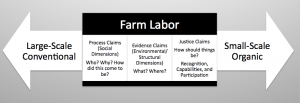
ENVIRONMENTAL JUSTICE AND FARM LABOR
Berkey, R. (2017). Environmental Justice and Farm Labor. London, UK: Routledge, Taylor & Francis Group.
Buy the book at Routledge (use the code FLR40 for a 20% discount) or on Amazon
Utilizing a model derived from literature on environmental justice overlaid with multiple scales of agriculture, Environmental Justice and Farm Labor provides key insights about laborers in agriculture in the United States. It addresses three main topics: (1) justice-related issues facing farmers and laborers on farms; (2) how history and policy have impacted them; and (3) the opportunities and leverage points for change in improving justice outcomes.
It explores who labors in US agriculture and the justice-related issues facing these workers, including occupational injury and illness, lack of access to healthcare, substandard housing, hunger, low wages, issues pertaining to immigration, and the inability to organize. In addition, it assesses the impacts of labor safety, immigration and international policy, and in particular the effects of organic and fair trade certification. Two detailed case studies, one based on conventional agriculture in Florida and the other on organic agriculture in the Northeast, highlight the interrelated but unique challenges facing those who labor in the different sectors of this complex agricultural system.
Finally, it touches on justice claims and the role of grassroots activism in improving justice outcomes by highlighting organizations operating at multiple scales to contribute to the livelihood of farmers and laborers in the different areas of agriculture.
From December 2021-December 2023, I am serving as an appointed representative to the Environmental Protection Agency’s Pesticide Program Dialogue Committee.

I have been a member of the Boston Food Access Council since Spring 2020, and serve on the Community Outreach, Education, and Engagement Subgroup.
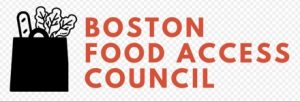
State University of New York- Potsdam
Lead Reviewer, Environmental Studies (ES) Department Review Fall 2020
Facilitator, Departmental Exploration of Experiential Learning in the ES Curriculum Spring 2021
In Summer 2021, I reviewed proposals for the The Georgia Sea Grant College Program, Marine Extension Service at The University of Georgia.
I serve as a member of the Farmworker Health and Justice Team of Coming Clean, Inc.
Farmworkers are the backbone of society: supplying crops for food, energy, and consumer products. These communities are vital to the survival of the country, national security, and our food autonomy as well as to those receiving aid from the U.S. around the world. Yet farmworkers are not involved, and often not even considered, in decisions and policies that subject them to substandard working conditions and toxic pesticide or chemical exposure.
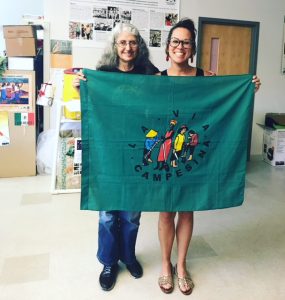
I am pictured here with Jeannie Economos of the Farmworker Association of Florida (who also co-convenes this Coming Clean working group).
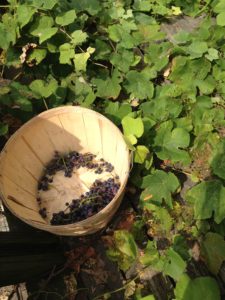
I serve as a member of the Advisory Council for the Agricultural Justice Project.
The Agricultural Justice Project (AJP) works to transform the existing agricultural system. We seek empowerment, justice and fairness for all who labor from farm to retail. Central to our mission are the principles that all humans deserve respect, the freedom to live with dignity and nurture community, and share responsibility for preserving the earth’s resources for future generations.
I am an affiliated faculty member to the Northeastern Consortium on Food Systems Sustainability, Health, and Equity.
We are faculty, students, and staff in an urban university who focus our research, teaching, and action on dimensions of the food system life cycle, from production through consumption to food waste disposal and reuse, with emphasis on urban and regional dimensions of food system sustainability, health impacts, and equity.
Springfield Technical Community College, Massachusetts STEM Week panelist: Know Where Your Food Comes From: Food Insecurity & Food Deserts, October 2020.
Boston Public Library, Climate Action for Everyone: A Learning Circle invited topic speaker: Climate Change, Agriculture and the Food System, September 2020.
Greenfield Community College, Community Lunch Talks; Topic 1: Climate Change, Agriculture and the Food System; Topic 2: Environmental Justice & Farm Labor, September 2020.
Sustainable Consumption Research & Action Initiative Conference: Sustainable Consumption Lifestyles, Session Chair, June 2020.
Old South Church, Boston, MA: Community Hour series on Agriculture and Climate Change, Speaker, April 2020. See the videos I provided in advance of this dialogue here and here.
Myra Kraft Open Classroom Series, Climate Change a Course for Everyone (School of Public Policy and Urban Affairs, Northeastern University): Panelist & Faculty Convener, January 2020. Agriculture and Food Systems, Panelist & Session Convener, January 2020. See the video from the full panel here.
Hostelling International Boston, HI Talks: Internalized Costs of Food Labor and Inequities, Panelist, September 2018.
Central Connecticut State University’s 11th Annual Global Environmental Sustainability Symposium: Food, Farming, & Sustainability, Keynote Speaker, March 2018; Environmental Justice and Farm Labor.
Emmanuel College Food Justice Week, October 2017; panelist for Justice in the Food Labor Industry.
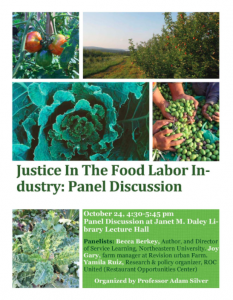
Open Meeting: Northeast Gathering on Domestic Fair Trade Open Sowing Presenter (5-minute presentation), August 2017; The Social Justice Values of the Organic Farmer.
Northeast Farm Access: Farmworker Justice Event at Esopus Ag Center, August 2016
In August 2016, NEFA’s Agroecology Program hosted a conversation about farmworker justice at which I was a featured speaker, with Dr. Claudia Ford serving as the facilitator. More information is available on their website.
Harvard University Just Food? Forum Panel Moderator, March 2015; Bridging the Gap: Models for Making Good Food Affordable for Consumers to Buy and Farmers to Grow
Northeast Organic Farming Association Summer Conference Co-Presenter, August 2013
Utilizing a model derived from literature on environmental justice overlaid with multiple scales of agriculture, Environmental Justice and Farm Labor provides key insights about laborers in agriculture in the United States. It addresses three main topics: (1) justice-related issues facing farmers and laborers on farms; (2) how history and policy have impacted them; and (3) the opportunities and leverage points for change in improving justice outcomes.
In the Fall semester each year (beginning in 2016), I teach a 1-credit course titled Food Justice & Social Change for a group of 15-19 students in the NU Explore Program for undeclared students. We have worked with multiple community partners for the course, including: the Sustainable Business Network, Fresh Truck, the Boston Mayor’s Office of New Urban Mechanics, Urban Farming Institute of Boston, Daily Table, and the YMCA ILC. We also have engaging guest lectures from many people throughout the Boston food justice community. You can see an example syllabus for this course here.
During the Summer I semester 2017, I taught a 4-credit course titled Food Justice & Community Development, affiliated with the Human Services department at Northeastern. We worked with three community partners for the course, including: the Sustainable Business Network, Fresh Truck, and The Food Project. We also met with many people throughout the Boston food justice community. You can see the Summer 2017 syllabus for this course here.
I taught this course again during the Summer II semester in 2018, and for this version of the course the service-learning component focused on summer meals for youth in Boston. To do so, we partnered with the YMCA of Greater Boston and Boston Public Schools. You can see the Summer 2018 syllabus for this course here.
The course ran in Spring 2020, the semester during which the COVID-19 pandemic moved everything to virtual formats halfway through. This semester we partnered with Women’s Lunch Place, St. Stephen’s Youth Programs, and the Fenway CDC Fair Foods Program. You can see the Spring 2020 syllabus here.
During Summer 2021, the course ran in a hybrid modality due to the ongoing pandemic. For this term, we partnered with Old West Church, the Afrimerican Culture Initiative, City Sprouts, and an independent group working on a Data Art Sculpture focused on raising awareness about food insecurity as exacerbated by the pandemic. You can view the syllabus from this term here.
My main role at Full Sail University in Winter Park, Florida, was to serve as the Course Director for Business Ethics and Social Responsibility. I developed and taught this course both in-person and in the online environment. My partner for our in-person course was the Farmworker Association of Florida.
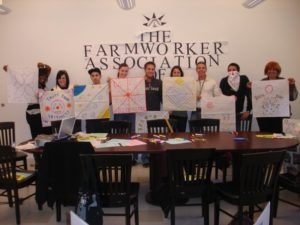
This is one of my classes from Full Sail (and some of my fellow Course Directors) working with the Farmworker Association of Florida on their bandana project.
While I was at Rollins College (2005-2008), I taught several courses, 2 of which were in the areas of environmental justice and activism. These were a course titled ‘Go Organic: New Ways of Living and Leading,’ which was a first year seminar and ‘Environmental Activism on the Peace River,’ which was an intercession course I co-taught with Biology faculty member Dr. Paul Stephenson. For these courses, my service-learning partners included the Orange County Environmental Protection Division and the City of Winter Park.
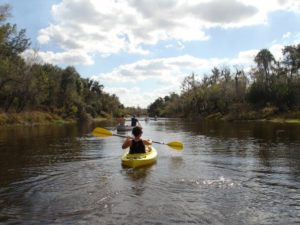
Here I am kayaking down the Peace River with our students in January 2008.
Berkey, B. (2018). An in-depth look at the Coalition of Immokalee Workers. [Book review]. Journal of Agriculture, Food Systems, and Community Development. Advance online publication. https://doi.org/10.5304/jafscd.2018.081.015
Issues Facing Family-scale Farmers and their Laborers in the Northeastern United States
In Spring 2017, The Natural Farmer (a publication of the Northeast Organic Farming Association) did a special issue focused on Farming for a Living Wage. I was invited to contribute a summary of my research as a means to frame the conversation about the opportunities and challenges that farmers and laborers within their network face. You can view this issue of the journal here.
Justice Issues Facing Family-Scale Farmers and Their Laborers in the Northeastern United States
In 2016, Dr. Tania Schusler and I published a piece in the Journal or Agriculture, Food Systems, and Community Development that built upon the survey data collected for my dissertation research, examining more deeply their implications for farmers and laborers within the Northeastern United States.
Just Farming: Technical Report and Executive Summary
This report was created and disseminated in partnership with the Northeastern Environmental Justice Research Collaborative for the purposes of a wider dissemination among the Northeast Organic Farming Association and beyond.
Dissertation (August 2014)
Just Farming: An Environmental Justice Perspective on the Capacity of Grassroots Organizations to Support the Rights of Farmers and Laborers
Farming Challenges Need Big Solutions
In the Winter 2013 issue of New York’s Northeast Organic Farming Association chapter newsletter, Catherine Lea utilized data from my dissertation research to talk about the challenges facing farmers and laborers on organic farms in the northeast and in New York specifically.
Chapter in Environmental Leadership: A Reference Handbook
I published a chapter titled Environmental Justice from the Ground Up in Deborah Rigling Gallagher’s 2012 volume on Environmental Leadership. This chapter details a case study of the Farmworker Association of Florida. You can learn more about this reference handbook here.
Centering Community Voice in the Massachusetts Green Recovery Conversation
In Spring 2021, I supported Ava Gallo’s Environmental Studies Capstone and Honors Interdisciplinary Thesis, for which she received a $1500 Undergraduate Research Initiative grant from the College of Social Sciences & Humanities (CSSH), a $500 Honors research grant, and a $1000 PEAK Experience Summit Award, Office of Undergraduate Research & Fellowships. Ava presented her work at the CSSH Undergraduate Research Forum in March 2021 and at the RISE EXPO in April 2021.
Evaluating Food Insecurity Solutions and Complementary and common goals of stakeholders in the emerging regional food system of the Northeastern United States: Mapping existing efforts to the United Nations’ Sustainable Development Goals
In Spring 2019, I supported two senior Northeastern University students- one on a Human Services independent study (Emily Breen) and the other on her Environmental Studies capstone project (Elizabeth Ventura). Emily presented her work at the RISE EXPO in April 2019.
Social Ecology and Social Stewardship within Sustainable Agriculture: An Environmental Justice Meta Study of Agroecology Research
In Fall 2016, Northeastern student Ava Gallo joined our team on the project regarding the social dimensions of agroecology. She earned the Honors Program Early Research Assistantship to support her work on this project.
From 2014-2016, I worked with Emma Clouse and Daniel McKenna on their research project, titled ‘The Organic Farmer: Portraits of the Diversity in Farming Organically in the Northeast.’ For this work, they:
• Received a grant for Undergraduate Research from the Office of the Provost, April 2015
• Presented a poster at the Spirit of Sustainable Agriculture: Engaging farmers, religious and spiritual leaders, and academics conference at Harvard University March 2016
• Presented at the Northeastern University RISE EXPO April 2016
BOOKS/ARTICLES
There are countless books and articles on the topics of environmental justice and farm labor. Here are a few that I find myself returning to, time and again:
Alkon, A.H. & Agyeman, J. (Eds.). (2011). Cultivating Food Justice: Race, Class, and Sustainability. Cambridge, MA: MIT Press.
Barndt, D. (2002). Tangled routes: women, work, and globalization on the tomato trail. Lanham, MD: Rowman & Littlefield Pub.
Gaddis, J. (2019). The labor of lunch: Why we need real food and real jobs in America’s public schools. Oakland, CA: University of California Press.
Getz, C., Brown, S., & Shreck, A. (2008). Class politics and agricultural exceptionalism in California’s organic agriculture movement. Politics & Society, 36(4), 478–507.
Gray, M. (2014). Labor and the locavore: the making of a comprehensive food ethic. Retrieved from http://librarytitles.ebrary.com/Doc?id=10779332
Guthman, J. (2004). Agrarian dreams the paradox of organic farming in California. Berkeley, CA: University of California Press. Retrieved from http://site.ebrary.com/id/10064761
Harrison, J. L. (2011). Pesticide drift and the pursuit of environmental justice. Cambridge, MA: MIT Press.
Holmes, S. M. (2013). Fresh fruit, broken bodies: migrant farmworkers in the United States. Berkeley, CA: University of California Press.
Holt-Giménez, E. (2017). A foodie’s guide to capitalism: understanding the political economy of what we eat. New York, NY: Monthly Review Press and Food FirstBooks.
Mares, T. (2019). Life on the other border: farmworkers and food justice in Vermont. Oakland, CA: University of California Press.
Mitchell, D. (2012). They saved the crops labor, landscape, and the struggle over industrial farming in Bracero-era California. Athens, GA: University of Georgia Press.
Obach, B. K. (2015). Organic struggle : the movement for sustainable agriculture in the United States. Cambridge, MA: The MIT Press.
Quandt, S.A. & Arcury, T.A. (Eds.). (2009). Latino Farmworkers in the Eastern United States. New York, NY: Springer.
Rodman, S., Barry, C., Clayton, M., Frattaroli, S., Neff, R., & Rutkow, L. (2016). Agricultural Exceptionalism at the State Level: Characterization of Wage and Hour Laws for U.S. Farmworkers. Journal of Agriculture, Food Systems, and Community Development, 1–22. http://doi.org/10.5304/jafscd.2016.062.013
Rothenberg, D. (1998). With these hands: the hidden world of migrant farmworkers today. New York, NY: Harcourt Brace & Co.
Schlosberg, D. (2004). Reconceiving environmental justice: global movements and political theories. Environmental Politics, 13(3), 517–540. http://doi.org/10.1080/0964401042000229025
Schlosberg, D. (2007). Defining environmental justice: theories, movements, and nature. Oxford; New York: Oxford University Press.
GENERAL WEBSITES
BLOGS AND ORGANIZATIONAL WEBSITES
Farmworker Association of Florida
Farm Labor Organizing Committee, AFL-CIO
CATA (El Comite de Apoyo a Los Trabajadores Agricolas- The Farmworker Support Committee)
Student Action with Farmworkers
Coming Clean- Farmworker Health and Justice Team
Domestic Fair Trade Association
